
Industry
14 Must-Have Features for a High-Converting Short-Term Rental Website
Posted on Jul 9, 2024

In today's competitive short-term rental (STR) market, your website is often the first point of contact between your brand and potential guests. As we discussed in our previous article, "Crafting the Optimal Digital Marketing Mix for Your Short-Term Rental Brand," driving direct bookings is crucial for maximizing your revenue and building a strong brand. A well-crafted digital storefront is key to achieving this goal.
In this article, we'll explore 14 essential features that every high-converting STR website should have. We'll cover basic elements that form the foundation of your online presence, intermediate features that elevate your site, advanced tools to maximize conversions, and next-generation capabilities that will keep you ahead of the curve.
Basic Features: The Foundation of Your STR Website
1. Accurate Pricing and Availability
Accurate Pricing and Availability: Accurate pricing and availability are crucial for building trust and reducing booking abandonment. Many STR websites fail by displaying outdated information or not syncing across platforms. Aim for real-time, dynamic pricing that adjusts based on demand and seasonality, with an up-to-the-minute availability calendar synced across all channels. Clearly communicate any special conditions or fees.
To improve, start by auditing your current system for delays in updates. Implement a robust channel manager (most PMSs like Guesty and Hostaway offer channel syncing as part of their package) and consider AI-powered dynamic pricing tools like PriceLabs, Wheelhouse, and Beyond. Regularly test your booking process to ensure consistency and transparency. Remember, accuracy in pricing and availability isn't just about information—it's the foundation of trust that converts browsers into bookers.
2. Fast and Smooth Browsing Experience
A fast, smooth browsing experience is essential in today's fast-paced digital world. Slow-loading pages can significantly impact conversion rates, with studies showing a 1-second delay in page load time can result in a 7% reduction in conversions. Common issues include unoptimized images, excessive plugins, and poor hosting.
Aim for load times of 2-3 seconds on both desktop and mobile, with smooth navigation and quick-loading images. To improve, start with a speed audit using tools like Google's PageSpeed Insights. Regular performance checks should be part of your routine maintenance. In the competitive STR market, every second counts in creating a positive first impression.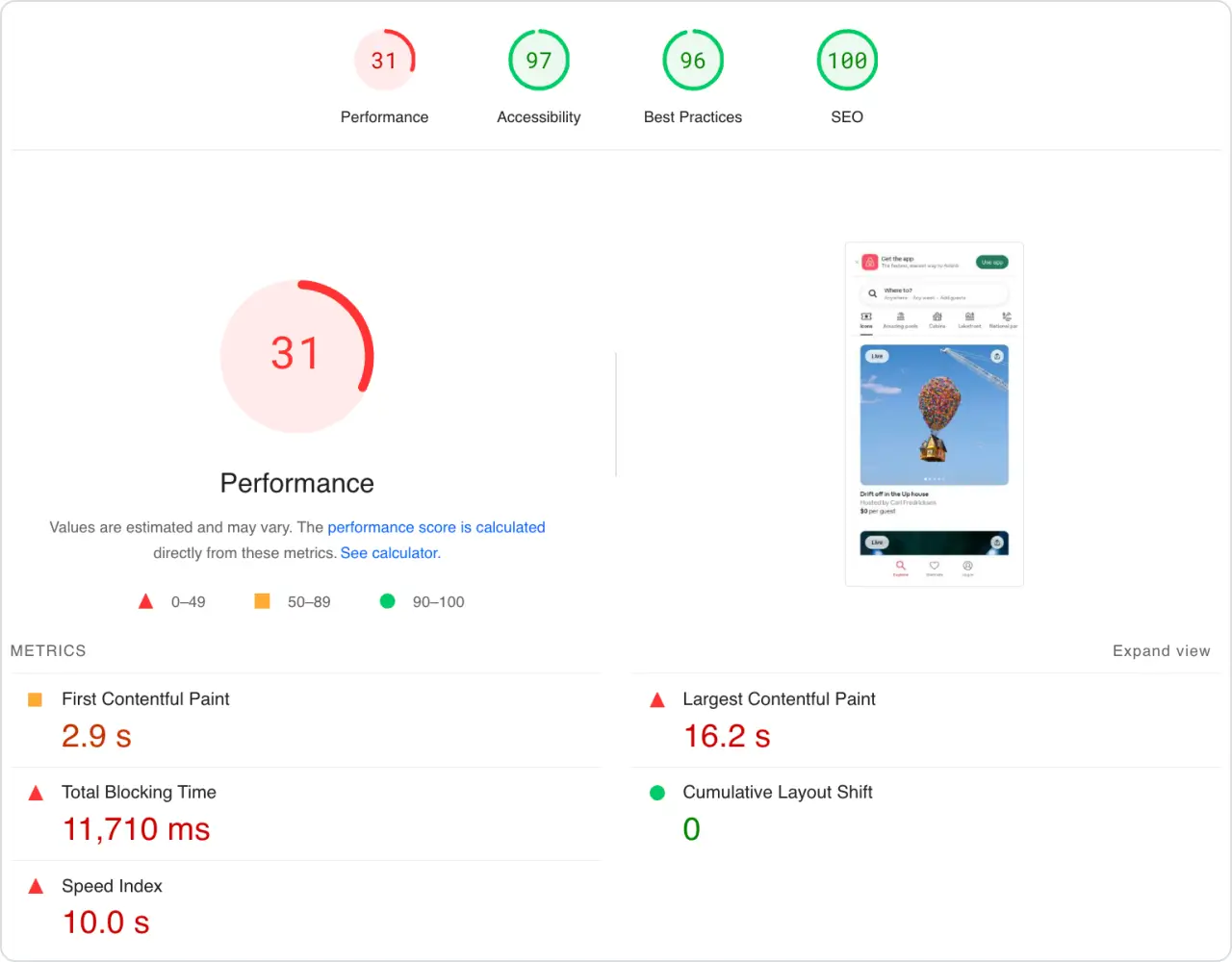
3. Mobile Optimization
With over half of web traffic coming from mobile devices, mobile optimization is crucial. Many STR websites falter by using a desktop-first approach or neglecting mobile-specific user experience elements. A well-optimized mobile site should load quickly, feature a clean design with easily tappable buttons, and offer a seamless booking process.
To improve, adopt a mobile-first design approach and use responsive design techniques. Optimize images for mobile, simplify navigation, and streamline forms for touch input. Regularly test on various devices. For many potential guests, your mobile site may be their only interaction with your brand, making it a critical factor in driving bookings and building loyalty.
4. Social Proof
Social proof elements like guest reviews are a powerful tool for building credibility and trust in the STR industry. Many websites underutilize this by burying reviews, only showing positive feedback, or worst, not showing any reviews at all. Effective social proof includes recent reviews and ratings prominently displayed on both the homepage and individual property pages.
To enhance your social proof, implement an automated review collection system and showcase reviews strategically throughout the booking process. Authentic social proof isn't just about showcasing your best reviews—it's about providing genuine insights into the guest experience, ultimately driving more bookings.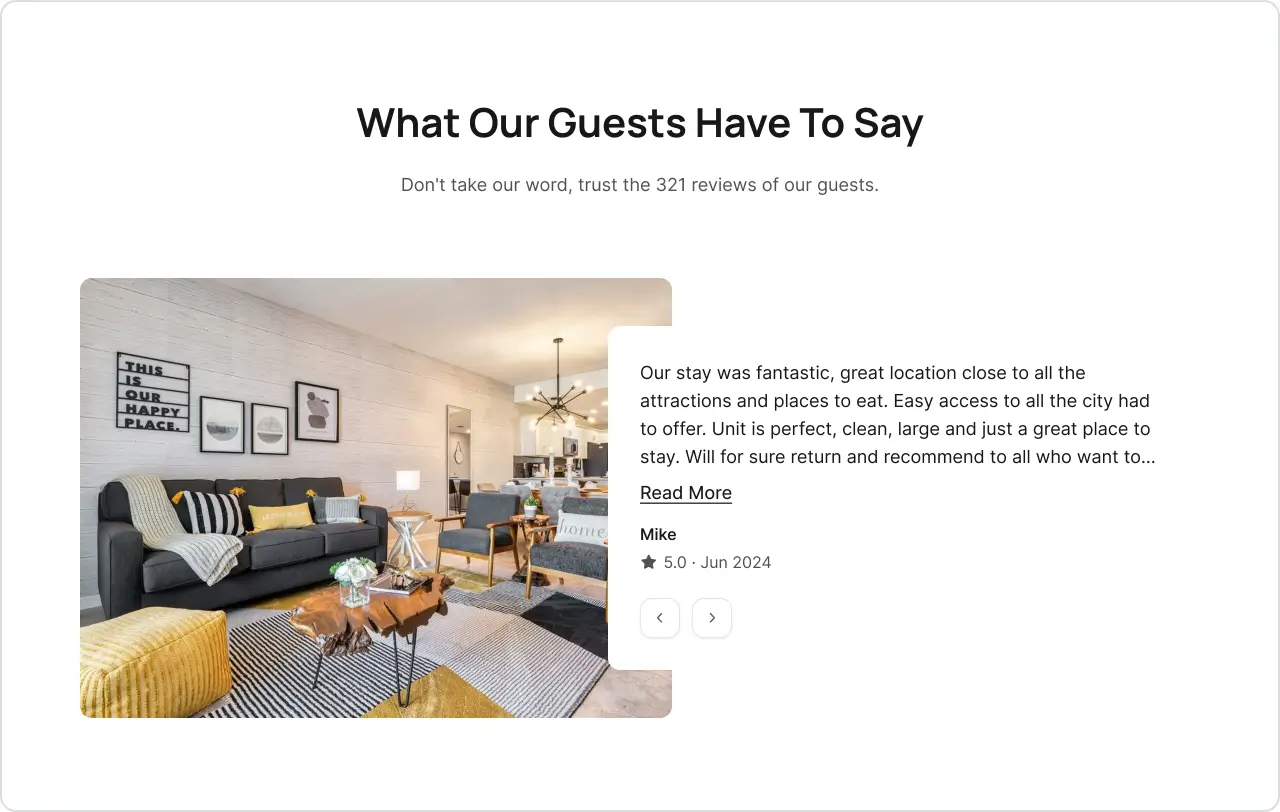

5. Compelling Brand Narrative
A compelling brand narrative sets you apart in the crowded STR market. Many websites fail to effectively communicate their unique story and values. A strong brand narrative should clearly convey your unique value proposition, share your brand's history and mission, and create an emotional connection with potential guests.
To improve, start by defining your brand's core values and unique selling points. Craft a compelling "About Us" page that tells your story authentically. Use consistent messaging and visuals across your site to reinforce your brand identity. Consider incorporating storytelling elements into your property descriptions and blog content. A well-crafted brand narrative doesn't just inform—it inspires and connects, turning one-time guests into loyal brand advocates.
6. Funnel Tracking
Effective funnel tracking is crucial for understanding user behavior and optimizing the booking process. Many STR websites lack proper analytics implementation, missing valuable insights. A well-implemented tracking system should monitor user journeys from initial visit to final booking, identifying drop-off points and conversion rates at each stage.
To improve, start by setting up Google Analytics with proper goal tracking. Implement event tracking for key actions like property views and booking initiation. Use tools like heatmaps and session recordings for deeper insights. Regularly analyze your data to identify bottlenecks and opportunities for improvement. Effective funnel tracking isn't just about collecting data—it's about turning that data into actionable insights that drive more bookings.
7. Direct Booking Education
Educating visitors about the benefits of booking directly is crucial for reducing reliance on OTAs. Many STR websites fail to clearly communicate these advantages. Effective direct booking education should highlight benefits like better rates, more flexible policies, or special perks for direct bookers.
To improve, create a dedicated section explaining the benefits of booking directly. Incorporate persuasive messaging throughout the booking process. Consider offering a best rate guarantee or exclusive direct booking perks. Effective direct booking education isn't just about listing benefits—it's about creating a compelling case that makes guests prefer booking directly with you.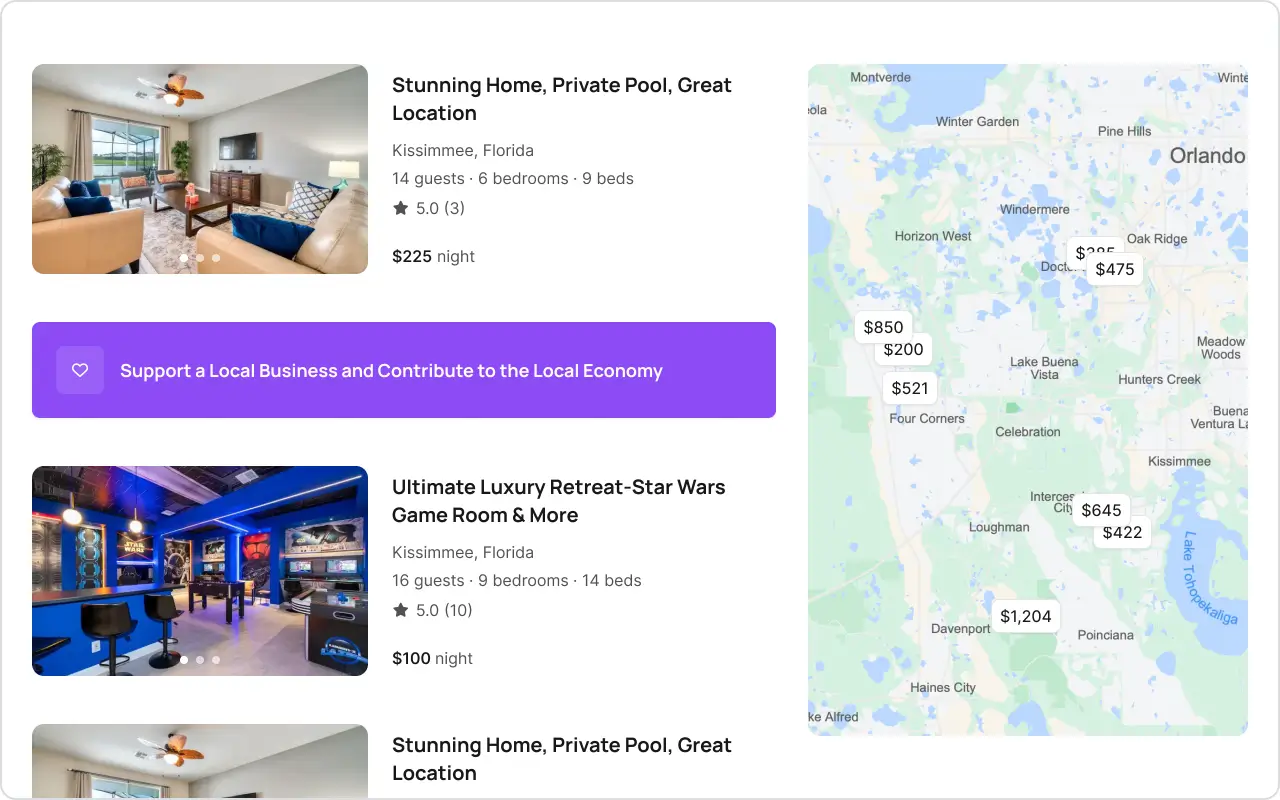
Intermediate Features: Elevating Your Online Presence
8. Visitor Touchpoint Capture
Capturing visitor information is vital for nurturing leads and re-engaging potential guests. Many STR websites miss opportunities to collect data from users who aren't ready to book immediately. Effective touchpoint capture should offer value in exchange for contact information, such as exclusive deals or price tracking features.
To improve, implement strategically placed lead capture forms. Always be clear about how you'll use the information and provide easy opt-out options. Remember, successful touchpoint capture isn't just about growing your list—it's about building a relationship with potential guests that can lead to future bookings.
9. Advanced Behavioral Insights
Advanced behavioral insights provide crucial data about user interactions with your site, going beyond basic analytics. Many STR websites overlook the wealth of contextual data available from user searches and browsing patterns. Effective behavioral analysis should track key metrics like most-searched dates, available properties per search, properties visited per session, and property-specific conversion rates.
To improve, implement custom event tracking in Google Analytics or a similar platform to capture search parameters and results. Use this data to identify popular travel periods, adjust inventory if certain searches consistently show low availability, and optimize underperforming property listings. Analyze which properties convert better and why, applying these insights to other listings.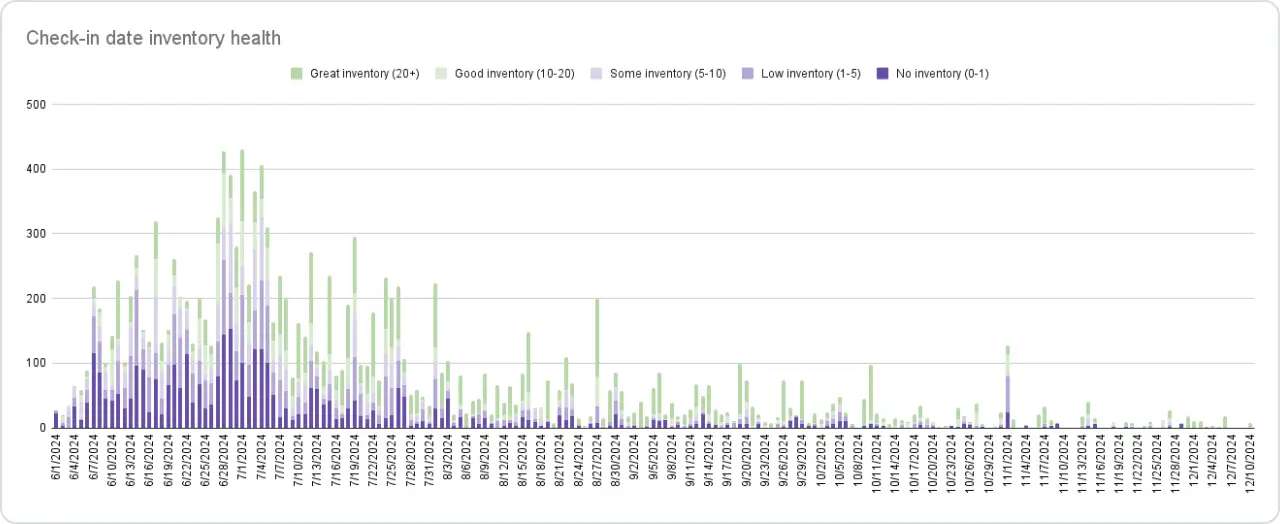
Advanced Features: Maximizing Conversions
10. Price Comparison
Transparent price comparison can significantly boost direct bookings. Many STR websites miss this opportunity, allowing guests to find better deals elsewhere. An effective price comparison tool should clearly show how your direct booking prices compare to OTAs, highlighting any additional value or perks.
To implement, ensure your direct prices are competitive. Create a dynamic widget that pulls real-time data from all OTAs, emphasizing comparison with the leading one in your market for clearer, more effective messaging. Clearly communicate other benefits of booking directly, such as free upgrades or flexible cancellation policies. Remember, effective price comparison isn't just about showing lower prices—it's about demonstrating the overall value of booking directly with you for those who are accustomed to booking on OTAs.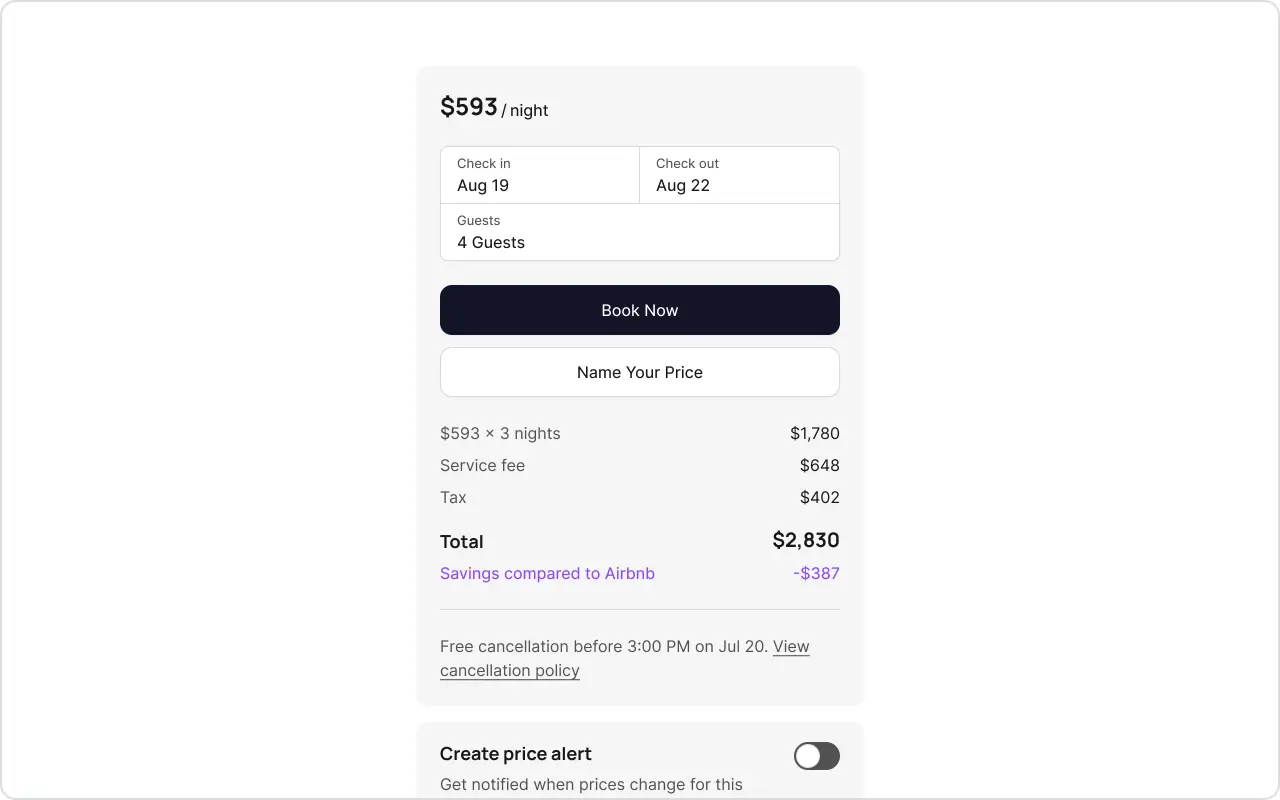
11. Automated Email Remarketing
Automated email remarketing is a powerful tool for re-engaging potential guests who've shown interest but haven't booked. Many STR websites fail to follow up effectively with interested visitors. A well-implemented remarketing system should send personalized, timely emails based on user behavior, such as abandoned cart reminders or price tracking updates.
To improve, implement an email marketing platform with automation capabilities. Always include clear calls-to-action and respect user preferences for communication frequency. Effective email remarketing is about providing value to guests that keeps you top of mind in their complex buying journey and nudges potential guests towards booking directly with you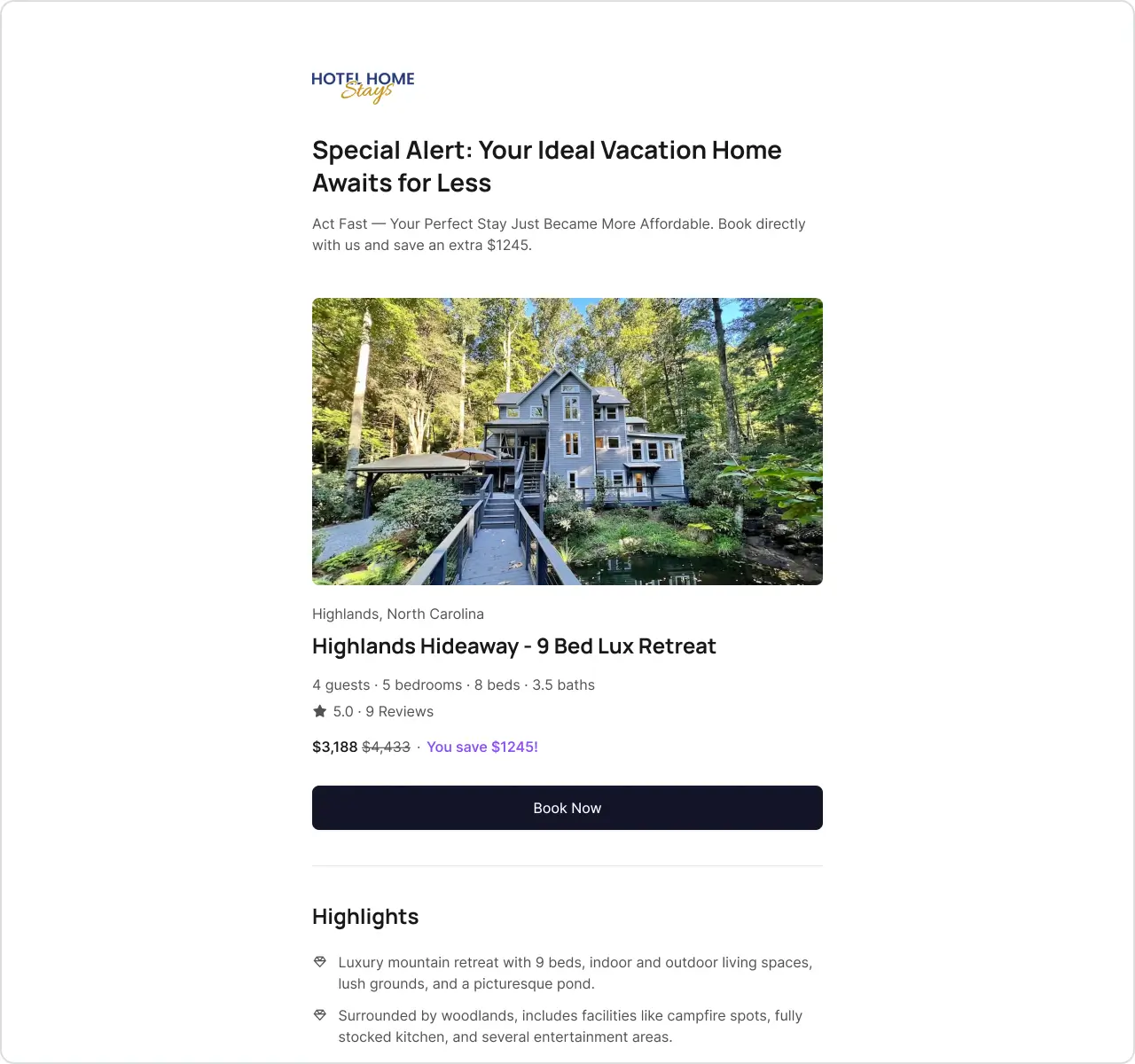
12. Unique Pages for Each Value Proposition
Creating unique pages for different value propositions allows for more targeted marketing and improved SEO. Many STR websites use generic pages, missing opportunities to cater to specific audience segments. Effective implementation involves creating dedicated landing pages for different nearby attractions, popular property features, or seasonal offerings.
To improve, identify your key value propositions and target audiences. Create tailored content and imagery for each. Optimize these pages for relevant keywords and make sure they are indexed by search engines. Providing highly relevant, persuasive information that speaks directly to the needs of different segments of your audience is the key to attracting new guests from search engines and increasingly AI companions.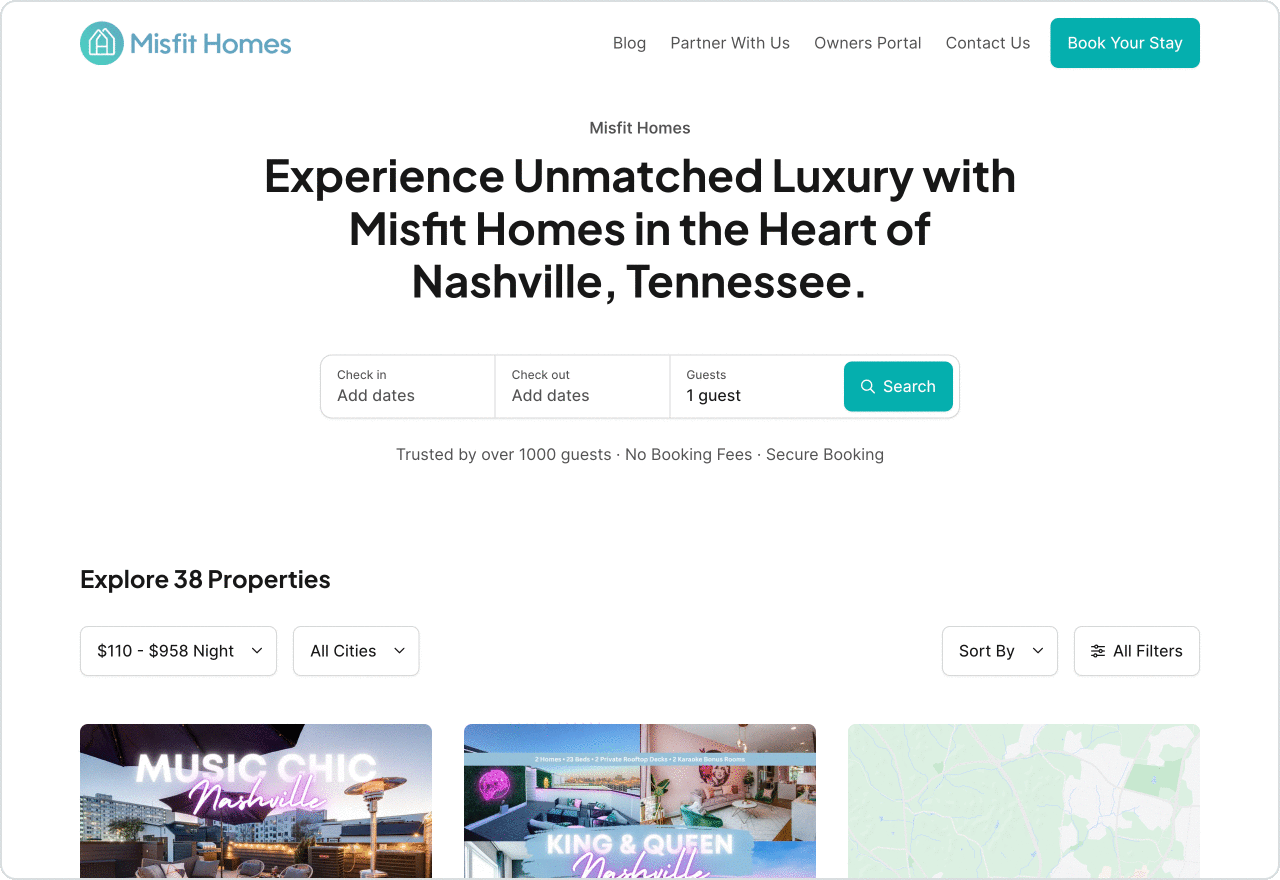
13. Experimentation engine
An experimentation engine is crucial for data-driven decision-making in website optimization, particularly in the travel industry. Many STR websites make changes based on assumptions rather than evidence. Major OTAs however run more than 25,000 experiments per day to improve their product using the scientific method. An effective experimentation system should allow you to split your website visitors into treatment and control groups, testing new features and measuring their impact on key metrics.
To implement, start with A/B testing tools like Statsig. Develop a hypothesis-driven testing strategy, focusing on high-impact areas of your site. Ensure you have sufficient traffic for statistically significant results. Run tests for an appropriate duration, considering factors like booking cycles. Analyze results carefully, looking beyond just conversion rates to understand the full impact. This is about a culture of continuous improvement based on real user data, leading to a more effective, higher-converting website over time. At hostAI, we run optimization experiments across
Next Generation Features: Staying Ahead of the Curve
14. AI-Powered Negotiation Agent
An AI-powered negotiation agent can provide personalized pricing and deals, significantly enhancing the booking experience. Most STR websites miss this opportunity for real-time, dynamic interaction with guests. An effective AI agent should offer customized rates based on factors like guest intent, stay length, seasonality, and expected occupancy. At hostAI, we've launched an MVP negotiation agent that has shown significant uplift in conversion rates for our clients.
It not only provides personalized pricing but also gathers rich contextual data about guests' visit purposes and preferences. This data enables hosts to personalize the stay experience and increase the lifetime value of guest relationships. By implementing such an agent, STR websites can capture bookings that might otherwise be lost while simultaneously improving guest satisfaction and loyalty.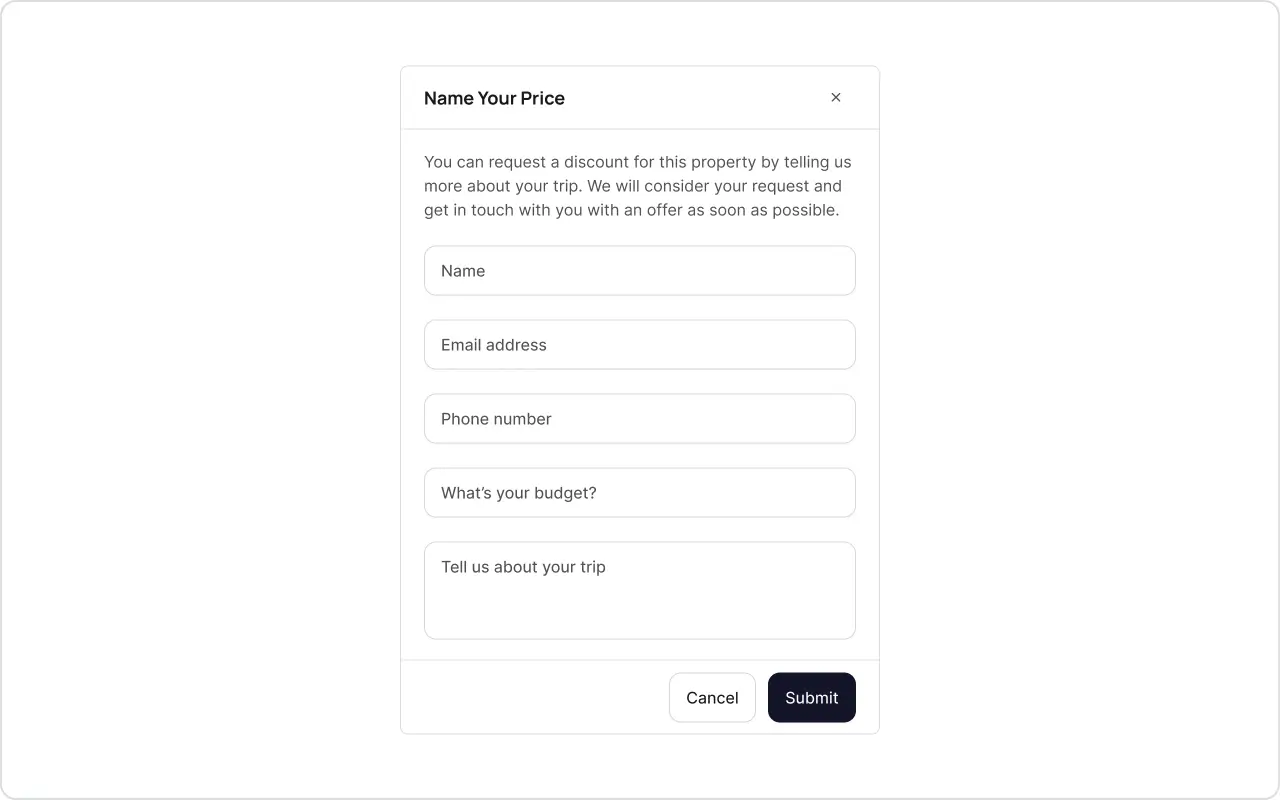
Conclusion
A high-converting STR website is more than just a digital brochure – it's a powerful tool for driving direct bookings and building your brand. By implementing these features, you'll create a website that not only showcases your properties effectively but also provides a seamless booking experience that encourages direct reservations.
Remember, building a great website is an ongoing process. Continuously gather feedback, analyze your data, and make improvements to ensure your site stays ahead of guest expectations and industry trends.
Start by assessing your current website against this list. Identify which features you already have and which ones you need to implement. Prioritize based on your specific needs and resources, and don't be afraid to invest in your website – it's an investment in the future of your STR brand.
However, we understand that implementing all these features can be challenging and time-consuming. That's where hostFront comes in. Our AI-powered solution is designed specifically for STR managers, incorporating all of these features and more out of the box. With hostFront, you can quickly elevate your online presence, offering a state-of-the-art booking experience that rivals or exceeds that of major OTAs.
Don't let your website hold you back – with hostFront, you can transform it into a powerful asset that drives growth and success for your STR brand.